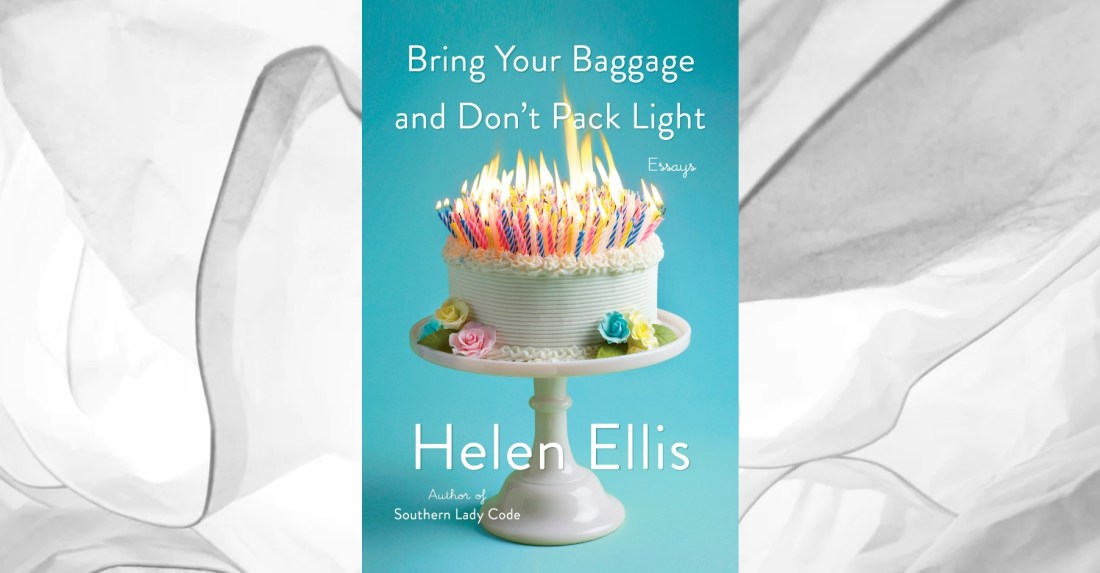The subject of female friendship has attracted the attention of literary writers in recent years. Largely these works have focused on the fresh, new friendships of younger women, with youthful characters still learning who they are and exploring the novelty of new friends. Some examples include Julie Buntin’s Marlena, Salley Rooney’s Conversations With Friends, Emily Gould’s Friendship, or Leigh Stein’s Self-Care. Helen Ellis shows us a different side of female friendship in her latest essay collection, Bring Your Baggage and Don’t Pack Light, depicting relationships through the wisdom of age and the lifelong experience of friendships filled with support and kindness. But she also makes it funny. In these new essays, Ellis explores marriage, sex, growing older, and her love of and skill playing poker. However, threaded throughout the collection of disparate narratives is the constant of her close-knit friendships.
Ellis is a humorist, a writer with a sharp eye for finding the funny in any situation. She cites her husband as describing her performance persona as her “Helen schtick.” Ellis is clearly an entertainer looking for an audience, both in the moment and afterward when writing about those events. She offers the kind of humor where she can joke about butt plugs yet still sound like a classy Southern belle. Ellis now resides in New York City, but about half the essays transport us to the South where she meets up with childhood friends and attends her parents’ garage sale. Her previous essay collection, Southern Lady Code, similarly merges her wit with polite charm, and the new collection further extends the Helen Ellis literary universe. And like that collection, her newest essays blend serious matters like breast cancer, menopause, and childbirth with sarcasm and witty commentary.
From the very first essay, friendship plays an important role for Ellis. “Grown-Ass Ladies Gone Mild” finds Ellis on a trip to Panama City, Florida with her childhood friends. Ellis doesn’t hold back her schtick even as the narrative turns more serious. When her friend Vicki’s double mastectomy enters the narrative, Ellis points out a “not-so-fun fact: when they cut off your breasts, you don’t get to keep your nipples.” If there is anything that defines Ellis’s writing, it is a keen ability to add levity to serious topics. We also see what a model of good friendship looks like, with Ellis meeting up with Vicki for the “Farewell Nipple Trip,” where they drink plenty of wine, even if it is from Georgia, where it “tastes exactly like you’d think it would taste: overly sweet and shallow.” The recurring theme through the collection is that her friends are the real structural support in her life, and she for them. We should all be so lucky.
Ellis writes bluntly about these women in her life. It isn’t just mastectomies, but their sex lives and pursuit of botox as well. In the essay, “Happy Birthday, You’re Still Fuckable,” she confesses to joking with her husband about the kinds of sex their dinner guests will be having, even as they are still walking out the door of their apartment. Ellis’s husband expresses some concern here, and it is perhaps a rare moment where Ellis concedes gossip isn’t necessarily flattering. Her husband worries if Ellis is going to write about other people’s juicy secrets, he and Ellis also might end up part of the “pornographjy potluck.” Ellis isn’t concerned, although she concedes to waiting until the guests have left the building at least.
Yet those secrets are exactly what make Ellis’s essay collection fun. She doesn’t hold back. She is not just talking about vibrators and nylon fetishes either. She deep dives into her own fears over aging, too. In “Are You There, Menopause? It’s Me, Helen,” she describes her battle with irregular menstruation and hot flashes. She is gossiping about herself, and that makes everything she says feel more genuine. She also talks candidly about her need for plastic surgery in “I Feel Better About My Neck,” where she seeks out back alley botox before finally paying a large sum of money for more professional solutions. The charm of Ellis’ essays is her willingness to debase herself.
There also is a wholesome quality to Ellis, even when she is casually gossiping about her friends’ fetishes. The dissonance between the earnest, Southern charm and the occasional potty humor creates tension, and when Ellis cuts the tension, we as readers end up laughing. Ellis isn’t ever mean or cruel, and that distinguishes her from so many humor writers who laugh at others’ expense. That also might explain why she still has so many close friends even after writing two books about their personal lives. The only person Ellis pokes fun of is herself, and Georgia’s wine industry.
The persona she crafts as narrator is a little bit naughty, but also self-aware. Ellis, the narrator, knows she’s sharing secrets she maybe shouldn’t be, but her voice is reassuring to us that we haven’t committed any wrong by listening. In the end, Ellis makes it clear she is writing about her friends, gossiping about her friends, judging her friends, because she loves them. In the acknowledgements of the book, Ellis begins by describing the last meal she ate at a restaurant with her friends before the pandemic shut down New York City. For a collection of essays focused on the importance of friendship, a year without those people seems like a harsh existence.
With her latest essay collection, Bring Your Baggage and Don’t Pack Light, Helen Ellis makes us laugh while depicting an idealized version of female friendship. She writes without fear of exposing her own vulnerabilities, of putting on display for everyone to see what many people would want to hide, and in that willingness, what emerges feels real and genuine.
NONFICTION
Bring Your Baggage and Don’t Pack Light
By Helen Ellis
Doubleday
Published July 13, 2021


